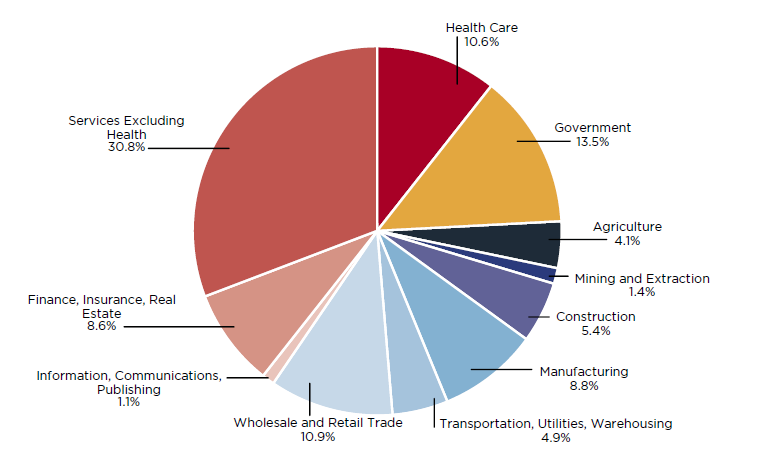HealthcareCosts
Climate Change’s Economic Impact: Navigating Challenges and Solutions

Climate Change’s Economic Impact: Navigating Challenges and Solutions
Climate change is not just an environmental issue; it carries profound economic implications that demand urgent attention. In this exploration, we dissect the economic consequences of climate change and explore potential solutions to mitigate its adverse effects.
Rising Costs of Extreme Weather Events
One of the immediate economic impacts of climate change is the escalating costs associated with extreme weather events. Hurricanes, floods, wildfires, and droughts are becoming more frequent and severe. The financial toll of rebuilding infrastructure, compensating for losses, and providing disaster relief places a substantial burden on national economies and insurance systems.
Threats to Agricultural Productivity
Climate change poses a significant threat to global agriculture. Shifts in temperature, precipitation patterns, and the frequency of extreme weather events affect crop yields and livestock productivity. Agricultural-dependent economies face challenges in ensuring food security, and disruptions in the agricultural supply chain can lead to increased prices and economic instability.
Rising Sea Levels and Coastal Infrastructure Vulnerability
Coastal regions are particularly vulnerable to the economic impacts of climate change, primarily due to rising sea levels. Infrastructure, including ports, roads, and cities, faces the risk of inundation. The economic consequences extend beyond immediate damages, affecting property values, tourism, and the viability of coastal industries.
Impact on Energy Infrastructure and Supply
The energy sector is intricately linked to climate change, both as a contributor to greenhouse gas emissions and as a victim of its impacts. Extreme weather events can damage energy infrastructure, disrupt supply chains, and lead to energy shortages. Transitioning to resilient and sustainable energy sources becomes not only an environmental imperative but also an economic necessity.
Healthcare Costs and Disease Spread
Changing climate patterns influence the spread of diseases and pose challenges to public health. Increased temperatures can expand the range of vector-borne diseases, impacting both human and animal populations. The economic burden of healthcare costs, loss of productivity, and strain on healthcare systems amplifies the broader economic implications of climate change.
Potential Displacement and Migration
The economic ramifications of climate change extend to population displacement and migration. Rising sea levels, extreme weather events, and resource scarcity can force communities to relocate. This displacement places pressure on host regions, challenging existing infrastructure, employment markets, and social services.
Insurance Industry Challenges
The insurance industry faces escalating challenges due to the increasing frequency and severity of climate-related events. The growing number of claims and uncertainties associated with climate change make it challenging for insurers to assess and manage risks effectively. This, in turn, can lead to higher premiums, reduced coverage, and increased financial volatility.
Investment Risks and Opportunities
Climate change introduces new risks and opportunities for investors. Industries heavily reliant on fossil fuels may face risks as policies shift towards sustainability. On the flip side, investments in renewable energy, green technologies, and climate-resilient infrastructure present opportunities for economic growth, job creation, and long-term sustainability.
Government Policies and Economic Resilience
To explore innovative solutions at the intersection of Economic Implications of Climate Change, visit vexhibits.com.
Streamlining Operations: The Importance of Accounting Software in Tribal Casinos

Key Takeaways:
- Insight into the technological advancements in tribal casino management.
- Understanding the role of specialized software in enhancing casino operational efficiency.
- Exploration of critical features to look for in casino accounting software.
- Discussion on how such software fits into broader financial systems.
The Roles of Software in Casino Management
With the intricate nature of tribal casino financials, it’s essential to have a solid system for management and accountability. Enter the modern era where software not only aids in surveillance and security but also underpins the financial aspects of casino operations. Like those offered by market leaders, including Arctic IT, high-quality accounting software is the backbone of tribal casino management. These platforms, specifically designed for the unique needs of tribal gaming, have revolutionized what it means to keep a casino functioning and thriving. Ensuring transparency, compliance, and efficiency, these systems are the unsung heroes that handle the complex web of transactions with ease and agility. Management can track earnings, payouts, and expenditures with unparalleled precision through automation and real-time processing, reshaping what we expect from casino accounting practices.
Key Features of Casino Accounting Software
Key to an excellent casino accounting system are the features it provides. Imagine a system where every chip, every spin of the slots, and each deal of the cards is meticulously recorded with pinpoint accuracy. This is the level of detail that cutting-edge casino accounting platforms offer. In evaluating software options, it’s crucial to look beyond the basics and toward comprehensive functionalities: real-time financial tracking, relentless fraud detection systems, and an innate ability to break down even the most complex jackpot structures. Real-time reporting tools become invaluable in internal audits, operational reviews, and strategic planning sessions. Coupled with complete regulatory compliance modules and asset management mechanisms, these systems aren’t just about keeping the books in check but empowering tribal casinos to maximize their financial performance and security. The software’s ability to combine disparate economic data points creates a unified financial narrative that drives more brilliant and informed operational decisions.
Improving Audit and Regulatory Compliance
Casinos, particularly those operated by tribal entities, navigate a challenging regulatory environment. Diligently adhering to rules and protocols is critical, and the right casino accounting software makes this complex task more manageable. A proactive system records transactions, highlights discrepancies, flags potential issues for further review, and ensures every penny is accounted for according to the strictest standards. With dynamic software solutions, the otherwise daunting audits and regulatory compliance tasks become streamlined, taking the burden off human managers and minimizing human error. It becomes easier for tribal casinos to stay abreast of the shifting tides of legal and financial regulations, updating their processes to maintain uninterrupted compliance, ultimately safeguarding their operations against possible legal repercussions and monetary penalties.
Integration with Other Systems
In the current digital environment, the interoperability of systems within a casino’s infrastructure is not just a feature but a necessity. The pinnacle of casino accounting software lies in its robust standalone features and its ability to integrate neatly with …

